
But I like not these great success of yours; for I know how






“But I like not these great successes of yours; for I know how jealous are the gods.” – Herodotus
Listen, O child of fortune, and let these words of Herodotus, the father of history, fall upon your heart as the sound of a distant warning bell. He wrote them in the telling of ancient kings and empires, men who rose to glory on the wings of victory only to be struck down by unseen hands. For in the old belief of the Greeks, the gods were jealous of mortal greatness. They looked with suspicion upon those whose pride climbed too near the heavens. And though the language of the ancients is veiled in myth, their meaning is eternal: great success, when untempered by humility, calls forth its own destruction.
The Greeks called this cosmic balance hubris and nemesis—the arrogance of man that awakens the vengeance of fate. To rise too high, to boast too greatly, to forget the limits of mortality—this, they taught, was to invite the storm. Herodotus saw it written in the fates of kings, and so he warned, not in anger but in sorrow: “I like not these great successes of yours.” For he had seen the wheel of fortune turn too many times, raising men to the stars only to dash them upon the earth. The gods’ jealousy was not the malice of heaven, but the law of balance, ensuring that all things remain within measure.
Think of Croesus, the mighty king of Lydia, whose wealth was said to rival that of the gods themselves. When he showed his treasures to the wise Solon of Athens, asking who was the happiest man alive, Solon replied that no man could be called happy until his life had ended well. Croesus, proud and blind, dismissed this wisdom. Yet not many years later, he lost his son, his kingdom, and his glory. Standing upon his own funeral pyre, he cried out Solon’s name, too late understanding the warning. His great success had been his ruin, for it had made him forget that fortune is a tide, not a possession.
Even beyond myth, history bears the same lesson. Consider Napoleon Bonaparte, conqueror of Europe, whose brilliance dazzled the world. He rose like a star blazing across the night, yet his ambition became too great, his pride too consuming. When he placed the crown upon his own head, declaring himself emperor, he forgot that every crown rests upon fragile flesh. The same wind that lifted him carried him into exile, and the glory he grasped with both hands dissolved like smoke. So it has ever been: those who climb too fast, too high, without reverence for fate, awaken the jealousy of the gods—or, in the language of our time, the correction of life itself.
The heart of Herodotus’s warning is not superstition, but wisdom. It tells us to beware of the intoxication of triumph, for success can make the soul drunk, and in its drunkenness, it forgets gratitude and restraint. Pride blinds the eye that once saw clearly. The humble, even in greatness, remain safe beneath the watchful gaze of the heavens; but the arrogant, believing themselves untouchable, step beyond the circle of divine favor. To forget one’s limits is to invite one’s fall.
So let the wise rejoice not too loudly in victory, nor despair too deeply in failure. The wheel of fate turns for all. What rises will one day descend, and what lies low may yet ascend again. The true hero is not the one who escapes this turning, but the one who walks it with grace—who meets fortune with gratitude and misfortune with calm. Such a soul is beyond the reach of the gods’ jealousy, for they envy only those who pretend to rival their power.
Therefore, my child of tomorrow, when great success comes to you—as it surely will if you walk with diligence—receive it not as a conqueror, but as a steward. Kneel before the mystery of fate, and say, “This too is a gift, and may it pass when it must.” Temper victory with humility, and you will remain whole. For the gods—be they the powers of heaven, or the silent laws of life—grant glory to test the heart. And only the heart that remembers its smallness is strong enough to hold greatness without being consumed by it.
So remember the words of Herodotus: “I like not these great successes of yours; for I know how jealous are the gods.” They are not words of fear, but of wisdom. They remind us that all triumphs are fleeting, that all crowns are borrowed, and that the truest strength lies not in rising high, but in remaining humble when we do.






AAdministratorAdministrator
Welcome, honored guests. Please leave a comment, we will respond soon